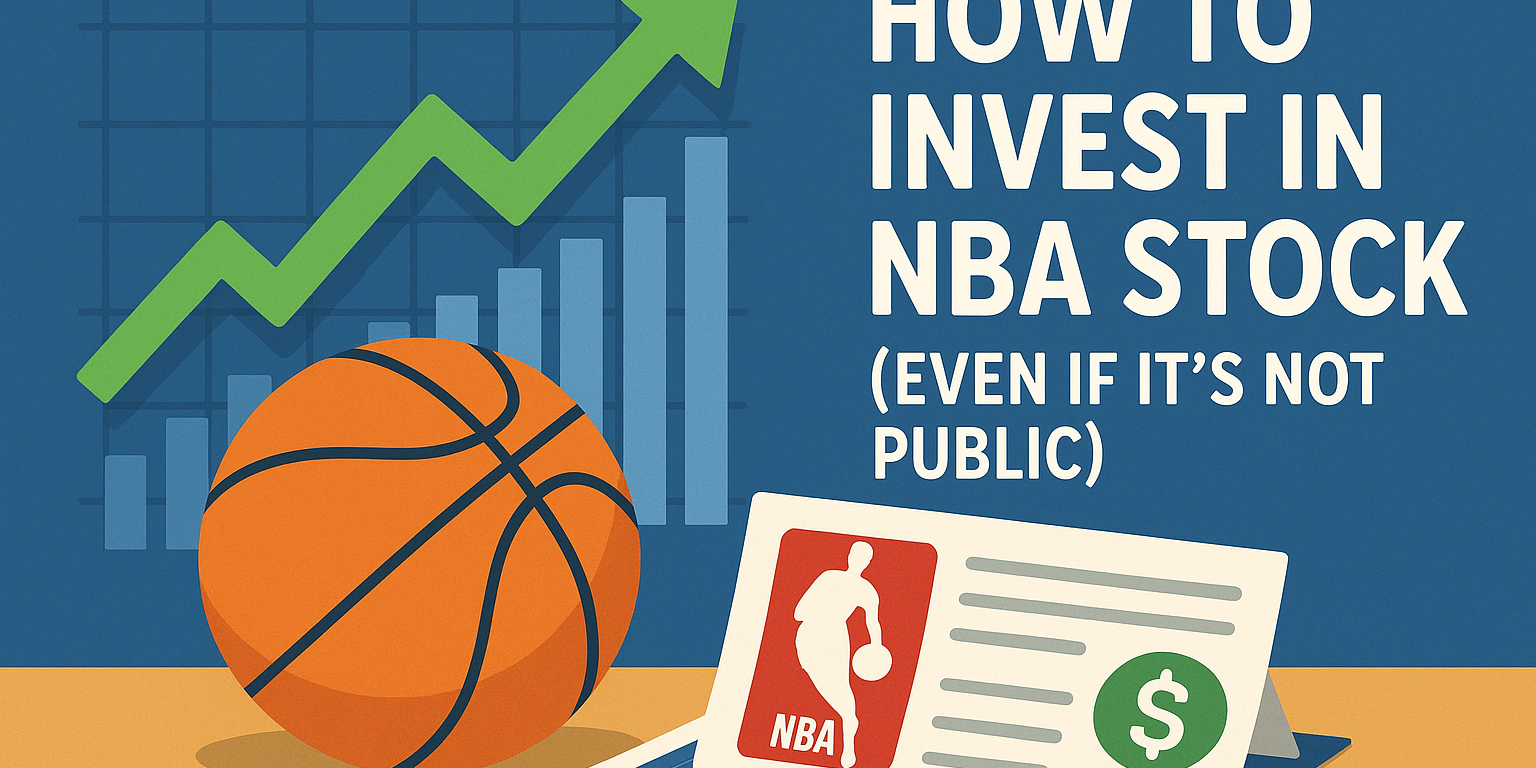Have you ever dreamed of owning a slice of your favorite NBA team? Perhaps you envision yourself a part-owner of the Lakers, celebrating championships, or a shareholder in the Knicks, benefiting from their legendary presence in the Big Apple. The allure of combining your passion for basketball with smart investment is powerful, but the reality of investing in the NBA isn’t always as straightforward as buying a share of Apple or Amazon.
Introduction to Sports Stocks
Investing in sports stocks offers a unique opportunity to combine a passion for sports with a smart investment strategy. This article will help readers understand the different categories of sports stocks and investment opportunities.
It is a good investment for those interested in professional sports and the stock market, and this article provides an overview of the sports stocks category and what makes it a good investment.

Can you buy a share of a sports team?
For most professional sports teams in the major US leagues (NBA, NFL, MLB, NHL), the answer is generally no. The vast majority of these teams are privately owned by individuals, families, or private ownership groups. Their ownership stakes are not traded on public stock exchanges. If these teams were publicly traded, they might issue different classes of shares, with each class offering varying voting rights and ownership stakes to clarify the corporate structure and investor options. This private ownership structure allows owners greater control and privacy, and it means the average investor cannot simply buy shares like they would in a public company.
Can you invest in a sport?
While you typically can’t buy stock directly in a sport like “basketball” or “football,” you absolutely can invest in companies whose business models are heavily tied to the success and operation of those sports. This is what we refer to as investing in the broader “sports ecosystem.” This includes media companies that broadcast games, apparel companies that sponsor leagues and players, sports betting platforms, and even companies that own arenas or sports-related real estate. For investors, this can be a strategic play to capitalize on the growing popularity and expansion of the sports industry.
What sports teams can I buy stock in?
The number of truly publicly traded sports teams is very limited, especially in North America.
- Madison Square Garden Sports Corp. (MSGS) is one of the most prominent examples. This publicly traded company owns two major professional sports franchises: the New York Knicks (NBA) and the New York Rangers (NHL). Investing in MSGS stock provides direct exposure to the financial performance of these two iconic teams, as well as the broader MSG Sports portfolio, which includes other sports-related ventures and entertainment properties.
- Manchester United (MANU) is a well-known example of a publicly traded football (soccer) club, listed on the NYSE. While not an NBA team, it demonstrates that public ownership of sports teams does exist, albeit primarily outside of the major North American leagues.
- Liberty Media Formula One (FWONK) is another example of investing in a major sports entity, though not a team, through its ownership of the Formula 1 racing series.
- Liberty Media also owns a significant stake in the Atlanta Braves, making them one of the few major league teams available to public investors through a parent company.
Most other major sports teams in the US, including all other NBA teams, are privately held.

Is buying a sports team a good investment?
Buying an entire sports team, as an individual or group, is an incredibly expensive and complex undertaking, typically reserved for billionaires and large investment consortiums. For this elite group, sports team ownership can be a good investment due driven by:
- Media Rights: Exploding broadcasting deals continue to drive revenue.
- Franchise Value Appreciation: Team values have consistently risen over decades, often outpacing inflation.
- Real Estate & Development: Many owners benefit from arena development, surrounding real estate, and entertainment complexes.
- Prestige & Influence: Beyond financial returns, ownership offers significant social and business prestige.
However, for the average investor, this isn’t a feasible path. Instead, the focus shifts to investing in publicly traded companies connected to sports, which we’ll discuss next.
Are sports teams publicly owned?
As highlighted, the vast majority of sports teams, especially in the US, are not publicly owned in the same way a typical corporation is. They are structured as private entities. The exceptions like MSGS or MANU are rare. This private structure allows for long-term strategic decisions, less public scrutiny of financial performance, and typically, more stable ownership.
Is the NBA on the stock market?
No, the National Basketball Association (NBA) itself is not a publicly traded company, nor is it listed on any stock exchange. The NBA operates as a private organization, overseeing the league’s operations, rules, and marketing for its 30 member teams. You cannot buy “NBA stock” as a direct investment in the league itself.
However, the NBA generates significant revenues through broadcasting rights, sponsorships, and global fan engagement, making related companies attractive to investors.

What NBA team is publicly owned?
As mentioned, Madison Square Garden Sports Corp. (MSGS) is the publicly traded company that owns the New York Knicks. This is the primary direct way to invest in an NBA team through the stock market. There are no other NBA teams that are directly and individually publicly owned.
How to buy Lakers stock?
You cannot directly buy stock in the Los Angeles Lakers. Like nearly all other NBA teams, the Lakers are a privately owned franchise. Their ownership shares are not available on any public stock exchange. If you see discussions about “Lakers stock,” it’s usually a misunderstanding, or it might refer to indirect investments in companies that have partnerships or dealings with the Lakers or the NBA, but not direct ownership in the team itself.
Is buying NBA stock a good investment?
Since you cannot buy “NBA stock” directly, the question shifts to whether investing in companies related to the NBA is a good investment.
Investing in companies that are deeply tied to the NBA (and the broader sports industry) can be a compelling opportunity, but like all investments, it carries risks and opportunities:
Potential Benefits:
- Growth of Sports Industry: The global sports market continues to expand, driven by media rights, global fan bases, and new technologies.
- Brand Loyalty: Sports teams and leagues often command unparalleled brand loyalty, translating into consistent consumer spending on tickets, merchandise, and media.
- Diversification: Sports-related stocks can add a unique sector exposure to a diversified portfolio.
- Inflation Hedge (for some assets): Premium sports assets (teams, media rights) have historically been resilient to economic downturns due to their unique entertainment value.
- Raising Cash: Public companies can raise cash through stock offerings, which can be used to fund growth and operations.
- Revenue Streams: Sports companies make money through ticket sales, merchandise, broadcasting rights, and sponsorships.
Considerations and Risks:
- Indirect Exposure: Investing in related companies means you’re not directly exposed to the team’s wins and losses but rather to the company’s overall business performance.
- Market Volatility: Like all stocks, these companies are subject to market fluctuations.
- Competitive Landscape: Media rights are highly competitive, and shifts in streaming or broadcasting platforms can impact revenue.
- Specific Company Risk: Nike’s performance depends on more than just the NBA; it’s a global apparel giant. MSGS’s performance is tied to its overall entertainment and sports portfolio, not just the Knicks.
- Not all investments have delivered the expected returns, and past performance is not always indicative of future results.

How to get started with NBA stock
As established, the NBA isn’t publicly traded, but you can invest in related public companies that benefit significantly from the league’s popularity and operations. Here are the key ways to gain exposure:
- Madison Square Garden Sports Corp. (MSGS): This is the closest you can get to direct NBA team ownership. As mentioned, MSGS owns the New York Knicks (NBA) and New York Rangers (NHL). The company also owns iconic venues and facilities, such as Madison Square Garden, which contribute to its brand and revenue. This stock trades on the NYSE.
- Nike (NKE): Nike is the official NBA jersey provider and a massive global sports apparel and footwear company. Its performance is heavily influenced by its association with major sports leagues and athletes. Nike has a rich history as a leader in athletic footwear, starting with track and field shoes before expanding into basketball. Nike is widely recognized as a leader in the sports apparel industry.
- Broadcast Partners:
- Disney (DIS): Through ESPN and ABC, Disney is a major NBA broadcast partner, airing games and related content. Millions of fans watch NBA games on ESPN and ABC, making these broadcasts valuable for advertisers and investors. Investing in Disney provides exposure to their vast media empire, which includes sports broadcasting.
- Warner Bros. Discovery (WBD): WBD, via TNT, is another significant NBA broadcast partner. Live NBA games are crucial for driving viewership and revenue.Their stock offers exposure to the cable television and media landscape that carries NBA games.
- Rogers Communications: Rogers is a major player in Canada, with significant ownership of Canadian sports teams and media assets.
Certain times of the season, such as the NBA Finals, can present unique investment opportunities due to heightened fan engagement and media attention.
The past performance and history of these companies can also inform investment decisions, as trends and achievements over time may impact future value.

For more insights into investing in related industries and market opportunities, explore our articles on WhatsApp Stock, Aldi Stock, and Telegram Stock.
Evaluating Market Performance of Sports Stocks
When considering an investment in sports stocks, it’s essential to evaluate the market performance of publicly traded sports companies. The sports industry has seen remarkable growth, with the global market now valued at over half a trillion dollars. Sports companies like Manchester United, Vail Resorts, and Rogers Communications have demonstrated strong stock performance, with some experiencing impressive gains in their stock prices. For example, Manchester United’s stock price has climbed more than 33% since its IPO in 2012, showcasing the potential for growth in this sector.
To assess whether a sports stock is a good investment, investors should look at key indicators such as revenue growth, market cap, and dividend yields. It’s also important to research the company’s financial health, analyze its position within the industry, and keep an eye on broader market trends. By thoroughly researching these factors, investors can identify sports stocks with strong performance potential and make informed decisions that could lead to significant returns. Whether you’re looking to invest in established names like Rogers Communications or growth-oriented companies like Vail Resorts, understanding the market dynamics is crucial for building a successful investment portfolio in the sports industry.
Technology in Sports: Impact on Stocks
Technology is rapidly reshaping the sports industry, and its influence on sports stocks is more significant than ever. Innovations such as advanced analytics, artificial intelligence, and virtual reality are not only enhancing the fan experience but also creating new revenue streams for sports companies. For instance, the NBA’s collaboration with Microsoft has brought cutting-edge data analytics and AI to the forefront, improving both player performance and fan engagement.
The rise of esports and virtual reality has also opened up fresh investment opportunities. Companies like TKO Group Holdings, which owns the UFC and WWE, have seen their stock performance benefit from the growing popularity of digital sports and immersive technologies. As technology continues to drive growth in the industry, investors should pay close attention to sports stocks that are leveraging these advancements. By identifying companies that are at the forefront of technological innovation, investors can position themselves to capitalize on the evolving landscape of the sports market and potentially achieve strong investment returns.
Risks and Considerations When Investing in Sports Stocks
While sports stocks can offer exciting investment opportunities, they also come with unique risks and considerations. The sports industry is inherently volatile—team performance, player injuries, and shifts in fan preferences can all impact the financial results of sports companies. Economic downturns can also affect consumer spending on sports-related products and services, making some sports stocks more sensitive to broader market conditions.
The competitive environment is another important factor. The rise of new media platforms and streaming services has disrupted traditional sports broadcasting, posing challenges for companies like Rogers Communications. Additionally, the distinction between publicly traded sports companies and privately owned teams, such as the New York Knicks and New York Rangers, can affect investment options and risk profiles.
To navigate these risks, investors should conduct thorough research into each company’s financial health, industry position, and long-term prospects. Diversifying your portfolio by including a mix of publicly traded sports companies like Vail Resorts, as well as keeping an eye on privately owned teams, can help reduce risk and enhance potential returns. By staying informed and adopting a long-term investment strategy, investors can better manage the ups and downs of the sports industry and work toward building a resilient and rewarding portfolio.
Recap: NBA Stock
While directly buying stock in the NBA or your favorite team like the Lakers isn’t possible, smart investors can still capitalize on the league’s immense popularity. The NBA itself is a privately operated entity, and nearly all its teams are privately owned. However, publicly traded companies such as Madison Square Garden Sports Corp. (MSGS), Nike (NKE), Disney (DIS), and Warner Bros. Discovery (WBD) offer indirect avenues to invest in the flourishing sports ecosystem.

FAQ related to NBA stock
Are there any publicly owned MLB teams?
As with the NBA, almost all Major League Baseball (MLB) teams are privately owned. There are no direct publicly traded MLB teams through which you can buy stock.
How many NFL teams are publicly owned?
Only one NFL team is publicly owned: the Green Bay Packers. They are unique in that they are structured as a non-profit corporation owned by their fans through shares of stock. However, these “shares” are more like community ownership certificates and do not offer financial dividends, shareholder equity, or traditional trading on a stock exchange. They primarily convey voting rights and a sense of ownership.
What NFL team has a stock?
The Green Bay Packers have a form of “stock,” but it’s important to understand it’s not a traditional stock traded on an exchange for investment purposes. It’s a non-dividend-paying, non-equity-bearing certificate of ownership used to fund team operations and maintain community involvement.
Is there an NFL stock?
No, similar to the NBA, the National Football League (NFL) itself is not a publicly traded company. You cannot buy stock directly in the NFL as a league. Investment in the NFL’s success comes through companies that have strong ties to the league, such as broadcasters, apparel sponsors, and sports betting companies.
Does ESPN have stocks?
ESPN itself does not have a separate stock that you can buy. ESPN is owned by The Walt Disney Company (DIS). Therefore, if you wish to invest in ESPN, you would do so by purchasing shares of Disney stock.

Ready to elevate your trading and invest with confidence?
At Maverick Trading & Currencies, we equip aspiring professional traders with a proven methodology, comprehensive education, and the opportunity to trade firm capital. If you’re serious about taking your trading skills to the next level, book a call with our team to learn more about how you can become a part of Maverick.










